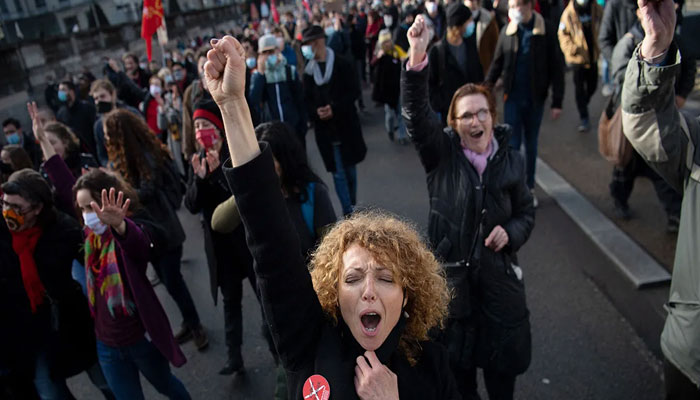Sustainable growth
LAHORE: The middle class, in addition to affluence, also makes a significant contribution by putting in strenuous efforts to reduce conflict. We have observed that there is no risk of war in European Union member countries where the middle class is dominant.
Unfortunately, Pakistan lags behind in expanding its middle class compared to its neighboring Asian economies. The middle class may have declined in Pakistan, while it has crossed 1.9 billion in Asia with a lot of new entrants to this class coming from India and Bangladesh.
The feud between France and England, Germany and France was a constant source of uncertainty in Europe before the emergence of a strong middle class on the continent.
China and India have buried their border disputes after the emergence of a strong middle class in both countries. Similarly, an increase in the middle class in Punjab would augur well for the normalization of Pak-India ties.
The middle class around the globe primarily comprises the most educated people in society. They add a vast amount of brainpower to society.
They are the true civil society and are the catalyst for change to a better way of life. The planners should embrace the Pakistani middle class to bring prosperity to the country. If we look at the gigantic growth shown by many Asian countries, they exhibit some common growth-enhancing factors.
These economies, including socialist China, understood the importance of reforms and their implementation; the importance of a free market economy; meritocracy; rule of law; a culture of tolerance; education, particularly unlocking the mysteries of science and technology.
We have instituted many reforms in the last two decades and claim that we operate in a free market economy. We have failed to implement most of the economic reforms in letter and spirit.
We have provided protection to many sectors. The basic ingredients necessary for growth are present in Pakistan, but the main issue is that of implementing the reforms agenda in letter and spirit.
It is the middle class that boosts the economy because it is the highest consumer of goods and services anywhere in the world. As people move from poverty to the middle class, their consumption of processed foods, home appliances, and other gadgets increases as they try to improve their quality of life. Another factor worth noting is that the middle class is quality conscious. The middle class forces domestic producers to improve their quality and efficiency or bow out to imported products.
Most of Asia, including China and India, is seeing a substantial rise in living standards. The momentum has been set for further affluence as the middle class works hard to further improve the quality of their lives.
Pakistan has lagged behind most of the other Asian countries in this transformation due to periodic periods of low and high growth.
When Pakistan adopts the high-growth path, its planners should recognize that high consumption entails a high environmental cost.
The electricity efficiency in Japan, for instance, is 10 times higher than in China and must be many times higher than in Pakistan. Developing countries could reduce their carbon footprint if they improve their energy efficiency, protect their forests, and keep their water channels clean from pollutants. Pakistani authorities should give equal importance to the environment while endeavoring to accelerate growth.
-
 Shocking Details Emerge In Martin Short’s Daughter Katherine's Death Investigation: 'Kept To Herself'
Shocking Details Emerge In Martin Short’s Daughter Katherine's Death Investigation: 'Kept To Herself' -
 Yerin Ha On Stepping Into The Spotlight In Bridgerton Season Four
Yerin Ha On Stepping Into The Spotlight In Bridgerton Season Four -
 Nakiska Ski Area Avalanche Leaves Youth Unresponsive, Second Skier Escapes Unhurt
Nakiska Ski Area Avalanche Leaves Youth Unresponsive, Second Skier Escapes Unhurt -
 Igor Komarov Missing In Bali: Seven Foreign Suspects Arrested In Kidnapping Probe
Igor Komarov Missing In Bali: Seven Foreign Suspects Arrested In Kidnapping Probe -
 'I Swear' Director Kirk Jones Says Bafta Broadcast Mishap Failed Tourette’s Advocate
'I Swear' Director Kirk Jones Says Bafta Broadcast Mishap Failed Tourette’s Advocate -
 Yogurt Shop Murders Solved: 1991 Austin Cold Case Finally Linked To Serial Killer
Yogurt Shop Murders Solved: 1991 Austin Cold Case Finally Linked To Serial Killer -
 Iran Tensions Rise As Trump Says He Is 'not Thrilled' With Nuclear Negotiations
Iran Tensions Rise As Trump Says He Is 'not Thrilled' With Nuclear Negotiations -
 Where Is Calvin Klein's Wife Kelly Klein Now After Divorce And Fashion Fame?
Where Is Calvin Klein's Wife Kelly Klein Now After Divorce And Fashion Fame? -
 Kourtney Kardashian’s Role As Stepmother Questioned
Kourtney Kardashian’s Role As Stepmother Questioned -
 Neil Sedaka Dies At 86 After Hospitalisation In Los Angeles
Neil Sedaka Dies At 86 After Hospitalisation In Los Angeles -
 'Lizzie McGuire' Star Robert Carradine's Reason Of Death Laid Bare
'Lizzie McGuire' Star Robert Carradine's Reason Of Death Laid Bare -
 Lisa Rinna Breaks Silence After Recent Reunion With Andy Cohen: 'I've Pissed Him Off'
Lisa Rinna Breaks Silence After Recent Reunion With Andy Cohen: 'I've Pissed Him Off' -
 Savannah Guthrie Mom Update: Unexpected Visitors Spark Mystery Outside Nancy's Home
Savannah Guthrie Mom Update: Unexpected Visitors Spark Mystery Outside Nancy's Home -
 Elle Fanning Shares Detail About Upcoming Oscars Night Plan With Surprise Date
Elle Fanning Shares Detail About Upcoming Oscars Night Plan With Surprise Date -
 Demi Lovato Spills Go-to Trick To Beat Social Anxiety At Parties
Demi Lovato Spills Go-to Trick To Beat Social Anxiety At Parties -
 Benny Blanco Looks Back At The Time Selena Gomez Lost Her Handrwritten Vows Days Before Wedding
Benny Blanco Looks Back At The Time Selena Gomez Lost Her Handrwritten Vows Days Before Wedding




